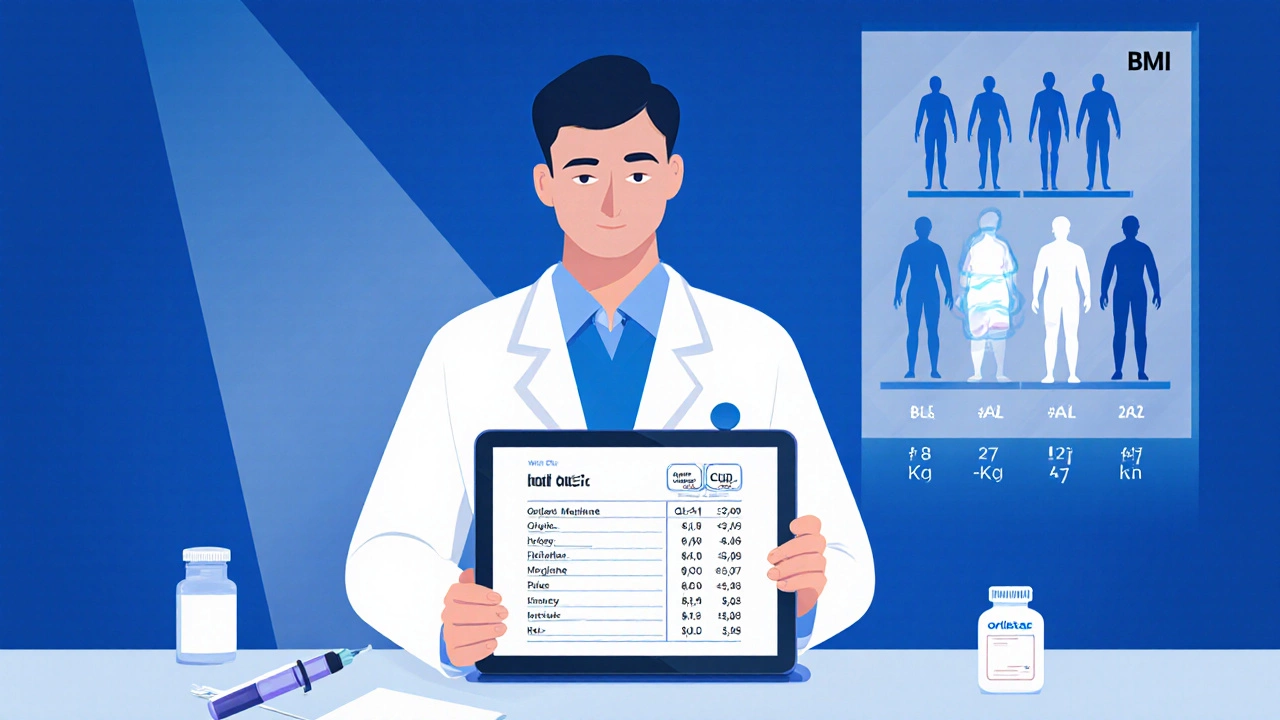Weight Loss Prescription Eligibility Checker
Find the Right Doctor for Your Weight Loss Needs
Enter your health information below to determine which type of doctor might be best suited for prescribing weight loss medication.
Recommended Doctor Type
Commonly Prescribed Medications
Trying to lose extra pounds often leads people to wonder who can actually write a prescription for weight loss pills. The short answer is: it depends on the doctor’s specialty, training, and the patient’s health profile. In this guide we’ll walk through the most common physicians who prescribe obesity medication, what qualifications they need, and how you can decide which doctor is right for you.
Key Takeaways
- Endocrinologists, bariatric surgeons, and primary‑care physicians are the main prescribers of weight loss medication.
- Prescriptions are usually tied to a BMI ≥ 30 kg/m² or ≥ 27 kg/m² with a weight‑related condition.
- Different doctors may favor different drugs - e.g., GLP‑1 agonists vs. Orlistat - based on expertise and patient needs.
- Insurance coverage often hinges on documented medical necessity and specialist referral.
- Choosing the right prescriber means matching your health goals with the doctor’s experience in obesity management.
Understanding Weight Loss Pills
Weight loss pills are medications approved by the FDA to aid in reducing body weight when combined with diet and exercise. They work through various mechanisms - some curb appetite, others block fat absorption, and a few increase metabolism. The most common classes in 2025 are GLP‑1 receptor agonists (like semaglutide and tirzepatide), lipase inhibitors such as Orlistat, and older agents like Phentermine‑Topiramate.
Each class carries its own safety profile and effectiveness data. For instance, GLP‑1 drugs have shown an average 10‑15 % body‑weight reduction in clinical trials, while Orlistat typically yields 3‑5 % loss. Knowing the differences helps you understand why certain doctors may recommend one over another.
Who Can Legally Prescribe These Medications?
In India, any physician who holds a valid medical license can write a prescription for weight loss medication, but the law and best‑practice guidelines encourage specialists with specific training to do so. The most frequent prescribers are:
- Endocrinologist - doctors who focus on hormones, metabolism, and diabetes. They are comfortable managing GLP‑1 agonists and monitoring blood‑sugar effects.
- Bariatric surgeon - surgeons who perform weight‑loss surgery also prescribe medication as a bridge or after‑care treatment.
- Family physician or Primary care physician - often the first point of contact; they can start therapy if the patient meets simple criteria.
- Obesity specialist - a newer designation; these doctors often have additional certification from the Indian Obesity Society.
Other professionals such as dietitians or pharmacists can advise on usage but cannot issue a prescription.
When Do Doctors Typically Write a Script?
Guidelines from the Indian Council of Medical Research (ICMR) and the FDA state that medication is appropriate when a patient meets at least one of the following:
- BMI ≥ 30 kg/m² without comorbidities.
- BMI ≥ 27 kg/m² with a weight‑related condition such as hypertension, type 2 diabetes, dyslipidaemia, or obstructive sleep apnoea.
Before prescribing, doctors usually order baseline labs - fasting glucose, lipid panel, liver function, and kidney function - to ensure safety. They also assess prior attempts at lifestyle change, current medications, and any history of eating disorders.

Choosing the Right Doctor for Your Situation
If you already have a chronic condition like diabetes, an Endocrinologist might be the best choice because they can fine‑tune both your glucose‑lowering drugs and the weight‑loss medication. If you are considering bariatric surgery down the line, a Bariatric surgeon can integrate medication into your surgical plan.
For most people without complex health issues, a Family physician or Primary care physician is sufficient. These doctors can evaluate your BMI, run necessary labs, and start a low‑risk medication like Orlistat or a low‑dose GLP‑1 agonist.
When you visit a weight‑loss clinic, ask the practitioner about their training in obesity management, how many patients they have treated with medication, and whether they follow the latest ICMR guidelines. A clinic that employs an Obesity specialist often has a multidisciplinary team - including dietitians and psychologists - which can improve long‑term success.
Comparison of Doctor Types Who Prescribe Weight Loss Medication
| Doctor Type | Commonly Prescribed Drugs | Typical Patient Profile | Additional Training Required |
|---|---|---|---|
| Endocrinologist | GLP‑1 agonists (semaglutide, tirzepatide) | Diabetes, metabolic syndrome, BMI ≥ 27 kg/m² | DM/Endocrine fellowship |
| Bariatric Surgeon | GLP‑1 agonists, Orlistat (as pre‑/post‑op) | Patients planning or recovering from surgery | Advanced surgical training, bariatric certification |
| Family / Primary Care Physician | Orlistat, Phentermine‑Topiramate, low‑dose GLP‑1 | General overweight/obese adults, BMI ≥ 30 kg/m² | Basic obesity‑management CME |
| Obesity Specialist | Any FDA‑approved option, often combined therapy | Complex obesity, multiple comorbidities | Certification from Indian Obesity Society |
Steps to Get a Prescription
- Schedule a consultation with a qualified doctor (see previous section).
- Undergo baseline assessments: height, weight, BMI, blood pressure, fasting glucose, lipid profile, liver and kidney function.
- Discuss medical history, current medications, and previous weight‑loss attempts.
- If you meet the guideline thresholds, the doctor will explain the drug’s mechanism, dosage, possible side effects, and monitoring schedule.
- Doctor writes the prescription; you fill it at a pharmacy. Most pharmacies will require the prescribing doctor’s registration number.
- Follow‑up visits are scheduled every 3‑4 weeks initially to assess response and adjust dosage.
Remember, medication alone isn’t a magic bullet. Successful weight loss still requires diet changes, regular exercise, and behavioural support.

Insurance and Cost Considerations
Many private insurers in India cover GLP‑1 agonists only if a specialist, usually an endocrinologist or bariatric surgeon, submits a detailed medical‑necessity letter. Orlistat is often covered under general drug benefits because it’s older and cheaper.
If you’re paying out‑of‑pocket, compare prices across pharmacies - online platforms like 1mg or Netmeds may offer a 10‑15 % discount. Some weight‑loss clinics bundle medication cost with counseling sessions, which can be a cost‑effective option.
Potential Side Effects and Safety Checks
Every drug class has warnings:
- GLP‑1 agonists may cause nausea, vomiting, and rare pancreatitis. They’re contraindicated in patients with a personal or family history of medullary thyroid carcinoma.
- Orlistat can lead to oily stools and fat‑soluble vitamin deficiencies; a daily multivitamin is recommended.
- Phentermine‑Topiramate carries a risk of mood changes and birth defects - it’s only for adults without pregnancy plans.
Regular lab monitoring (every 3‑6 months) helps catch any emerging issues early.
Frequently Asked Questions
Can a general practitioner prescribe weight loss pills?
Yes, a licensed GP can prescribe medications like Orlistat or low‑dose GLP‑1 agonists if the patient meets BMI criteria and has no contraindications. However, for more complex cases or newer drugs, a specialist’s referral may improve insurance approval.
Do I need a referral to see an endocrinologist for weight loss meds?
In most Indian cities, you can book a direct appointment with an endocrinologist. Some insurance plans, however, require a primary‑care referral for specialist consultations.
What is the minimum BMI required for a prescription?
The standard guideline is BMI ≥ 30 kg/m², or ≥ 27 kg/m² if you have at least one obesity‑related condition such as type 2 diabetes or hypertension.
Are weight loss pills safe for long‑term use?
Safety depends on the specific drug. GLP‑1 agonists have been studied for up to 2‑3 years with a good safety record. Orlistat is considered safe for indefinite use if vitamin levels are monitored.
What should I expect during the first follow‑up appointment?
Your doctor will check weight change, side‑effects, blood pressure, and may repeat labs to ensure the medication isn’t affecting liver or kidney function. Dosage adjustments are common at this stage.
Finding the right prescriber is a crucial step on your weight‑loss journey. By understanding which doctors are equipped to manage obesity medication, what criteria trigger a prescription, and how to navigate insurance and follow‑up care, you can make an informed decision and stay on track toward lasting results.








